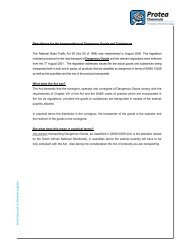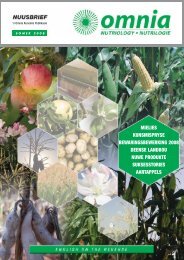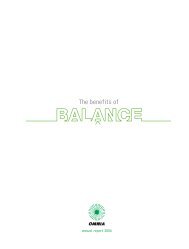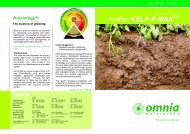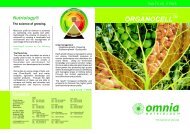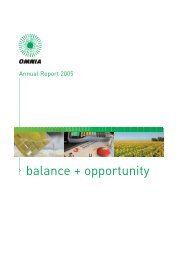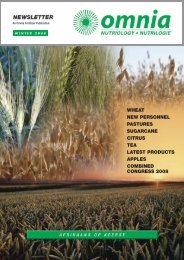omnia holdings annual report 2010 omnia holdings annu
omnia holdings annual report 2010 omnia holdings annu
omnia holdings annual report 2010 omnia holdings annu
You also want an ePaper? Increase the reach of your titles
YUMPU automatically turns print PDFs into web optimized ePapers that Google loves.
About this <strong>report</strong><br />
This sustainability <strong>report</strong> presents a consolidated view of the<br />
Omnia Group’s economic, social and environmental performance<br />
for the year ended 31 March <strong>2010</strong>. We aim to provide a<br />
balanced, understandable and comparable view of our business<br />
by giving a frank account of our sustainability achievements as<br />
well as challenges.<br />
Through this <strong>report</strong>, the Omnia Group aligns itself with<br />
international sustainability best <strong>report</strong>ing practices, including the<br />
Global Reporting Initiative (GRI), recognised internationally as the<br />
benchmark for sustainability <strong>report</strong>ing. The Group subscribes to<br />
the vision of the GRI, in that disclosure on socio-economic and<br />
environmental performance should become as commonplace<br />
and comparable as financial <strong>report</strong>ing, and that such disclosure<br />
is inextricably linked to financial success.<br />
We recognise that we still have some way to go in aligning<br />
our <strong>report</strong>ing processes to the GRI. However, in keeping with<br />
the GRI’s vision, we will continue to improve our non-financial<br />
<strong>report</strong>ing processes over time, based on the principles of<br />
accountability and transparency. We welcome feedback from<br />
our stakeholders to assist us to continually improve our<br />
sustainability <strong>report</strong>ing.<br />
The Group also supports the principles of openness, integrity<br />
and accountability as advocated in the King Code of Governance<br />
for South Africa of 2009 (King III) and the Code of Corporate<br />
Practices and Conduct reflected in the 2002 King Report<br />
(King II). Moreover, we subscribe to the concept of the triple<br />
bottom line, which embraces economic, social and<br />
environmental relationships through an integrated sustainability<br />
approach that encompasses all the Group’s stakeholders –<br />
our shareholders, customers, employees and the communities<br />
in which we operate.<br />
We continue to seek to improve our sustainability <strong>report</strong>ing,<br />
moving beyond compliance to focus on opportunities for, but<br />
also challenges to, our sustainability, which we believe should<br />
increasingly inform our strategy and enable us to enhance our<br />
relationships with stakeholders. Our aim is the long-term<br />
integration of economic development, environmental quality<br />
and social equity into our business practices to continually<br />
improve performance.<br />
The reader is invited to access more detailed information on our<br />
website where this <strong>report</strong> is also available in an online version.<br />
Informing the boundaries of this <strong>report</strong><br />
Broad-based black economic empowerment (BBBEE) is regarded<br />
as integral to our sustainability, and relates to both economic and<br />
social aspects. Therefore, although our BBBEE initiatives only<br />
concern our South African operations, they have been included<br />
as part of this <strong>report</strong>.<br />
Report assurance<br />
We have not obtained independent third-party assurance of this<br />
Sustainability Report for the <strong>2010</strong> <strong>report</strong>ing period. We assess<br />
our application of the GRI <strong>report</strong>ing framework to be at Level C.<br />
Statement from the Group Managing Director<br />
The year under review saw intense debates around two major<br />
world events – the global economic crisis and climate change –<br />
OMNIA ANNUAL REPORT <strong>2010</strong> 35<br />
which once again demonstrate our global interdependency, but<br />
at the same time revealed a need for solutions to be crafted at<br />
local and national levels.<br />
Although the outcome of the Copenhagen climate talks at the<br />
end of 2009 was disappointing, with developed countries’<br />
targets to cut their greenhouse gas emissions remaining low,<br />
South Africa made a commitment to cut its carbon footprint<br />
by slowing emissions by 34% below projected levels by 2020.<br />
Dependent on coal for almost 90% of its electricity needs,<br />
South Africa is the twelfth-biggest emitter of carbon dioxide in<br />
the world, producing more than 40% of Africa’s fossil fuelrelated<br />
carbon dioxide emissions. Despite this, local companies<br />
have not made much headway when it comes to carbon trading,<br />
which is part of the Clean Development Mechanism of the<br />
United Nations’ Kyoto Protocol.<br />
And although the position on carbon credits beyond 2012 is still<br />
uncertain, the pressure on climate change abatement is not<br />
going to recede.<br />
In an unevenly globalised world, Omnia realises the need for<br />
“bottom-up” alternatives to pursuing carbon reductions, and has<br />
already amassed about 825 000 carbon credits, generated<br />
through the nitrous oxide reduction project at our Sasolburg<br />
EnviNox ® Clean Air plant. EnviNox ® was commissioned in terms<br />
of the Kyoto Protocol’s Clean Development Mechanism and has<br />
reduced our nitrogen oxide emissions by more than 98%.<br />
400˛000 carbon credits were sold in November 2009.<br />
And while we regret the fact that the world was unable to reach<br />
a solution at Copenhagen, we are hopeful that concerted efforts<br />
by companies, civil organisations and governments through<br />
international alliances would serve as a basis for further<br />
discussion towards a suitable agreement on developing a global<br />
framework for climate change.<br />
We are fully aware that long-term opportunities for the Group<br />
exist in the renewable energy, water, mining and food sectors,<br />
and Omnia is well positioned to make a significant impact in<br />
these areas.<br />
Omnia recognises in particular the potential in alternative energy<br />
over the next decade, with uranium demand expected to more<br />
than double by 2030 as increasing numbers of countries turn to<br />
nuclear energy for their power requirements. Although nuclear<br />
power is not considered renewable; since no combustion is<br />
involved, nuclear power generation produces no carbon<br />
emissions. We believe mining industries in southern Africa<br />
are set to benefit from escalating local and global demand<br />
for uranium, and although the tick-up in uranium processing<br />
has been slower than expected, Omnia is confident that we<br />
can exploit the opportunities available in this area, with our<br />
strong product basket in terms of supplying mining explosives<br />
and chemicals.<br />
Expectations for growth in the mining sector are not only driven<br />
by the growth in alternative energy, but locally also by Eskom’s<br />
additional coal requirements.<br />
The production of shocktube at Omnia’s Losberg facility,<br />
which started during 2009/10, signalled an entry for the Group<br />
into the underground mining sector, while BME’s new



